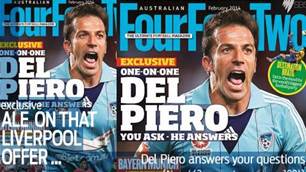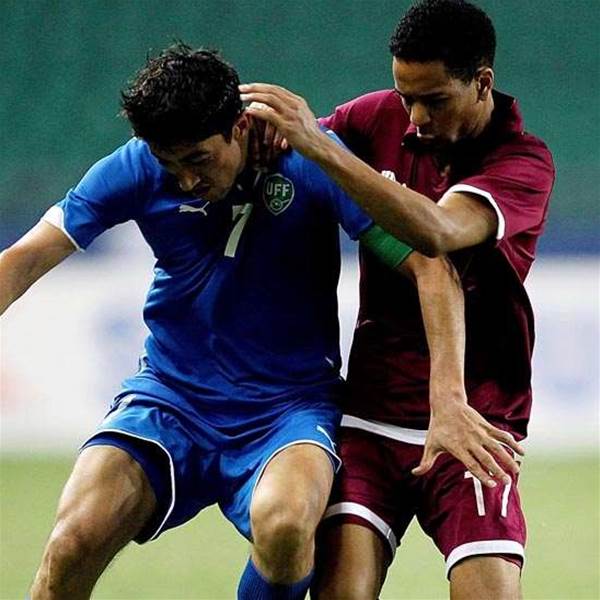HOST nation Qatar will be hopeful of progression if they can get the better of improving Uzbekistan, underachieving China and a Kuwaiti team which managed to defeat Australia. The hosts and the Uzbeks are favourites but if China find form the group could run closer than expected.
Qatar
During the first seven Asian Cups dating back to 1956, the host nation had won five tournaments. However, with the one-off exception of Japan in 1992, every other Asian Cup since 1980 has been taken home by a visiting nation. Qatar will be looking to buck that trend in 2011.
Any manner of host nation advantage paid no dividend when the Middle Eastern peninsula of Qatar hosted the 1988 tournament, with a single win all they could muster as they failed to progress from the group stages. However, much has happened since the late '80s and we're not just referring to the receding of Robbie Slater's ginger square top.
Qatar has used its vast wealth to strengthen its position in the world game, including a very expensively assembled 2022 World Cup bid. Money has also funnelled into their domestic competition, The Qatar Stars League (or Q-League) which, despite being based in a country of less than 1.7m people, even has a second tier, unlike Australia.
In the past that money has attracted the likes of Gabriel Batistuta, Sonny Anderson, Fernando Hierro, Frank De Boer, Marcel Desailly, Jay-Jay Okocha, Abedi Pele and World Cup winner Frank LeBoeuf, who once said "There are more stars in Qatar than in France."
As such, a Qatar national team that will mainly be made up of Q-League-based players should not be discounted for lacking the overseas stars of their rivals. Australia may have made light work of Annabi in Brisbane during 2010 World Cup qualification with a 4-0 drubbing, but it was a stalemate in the Doha return as the Socceroos got over the line to South Africa.
The famous Qatar cash flow has also been used to boost the national team by the most direct of measures - nationalising as many potential international players as they can throw money towards, such as Senegal-born defender Abdullah Koni, Brazilian midfielder Fábio César Montezine and Uruguayan Sebastian Soria.
This has developed a technically proficient side who will be familiar with each other through their joint Q-League involvement.
As for the Doha-born stars, striker Khalfan Ibrahim has a decent international goalscoring record, including a late consolation against Australia in 2008, with a reputation for producing some breathtaking finishes to boot. Fellow striker Ali Afif also has goals against the likes of Japan, Iran and Saudi Arabia to his name in recent years.
Star Man
Midfielder Sebastian Soria was born in South America, but was discovered in 2004 in the Uruguayan minor leagues by a cyclist who "knew a scout". He jumped at the chance to play in the Middle East and two years later he made his debut for Qatar and was the only player to score for his nation at the 2007 Asian Cup. Over the past two phases of World Cup qualifying he terrified Australian defences and could do the same in Group A.
The Coach
Bruno Metsu - The French Michael Bolton lookalike is back again, but this time with Qatar. He is best known by fans for his exploits with Senegal in the 2002 World Cup in Asia where he beat his home nation in the opening match and took Senegal all the way through to the quarter-finals where they were defeated by Turkey. Metsu has taken charge of Qatar for the 2011 Asian Cup and will be hoping to better the third-place finish he managed to achieve with the UAE in 2007.
FourFourTwo Predicts
Home advantage will carry them out of the group where momentum could gather towards a successful campaign. The final showpiece might prove a stretch too far though.
Uzbekistan
When the Socceroos were drawn with Uzbekistan in the final phase of 2010 World Cup qualifying, alarm bells went off at the potential banana skin of two matches against the emerging eastern Asian nation. The Uzbeks were on the rise, led by star players Server Djeparov, Alexander Geynrikh and Maksim Shatskikh, and had won six of their previous seven internationals, scoring 15 goals. A quarter-final loss to eventual finalists Saudi Arabia in the 2007 Asian Cup only served to raise expectations even higher.
However, the Uzbeks never really made it out of first gear in pursuit of South Africa, losing their first game 3-0 to Qatar before going down 1-0 to Australia in Tashkent. By the time the return leg in Sydney in April 2009 rolled around, the two teams were headed in opposite directions - Australia's win saw them on the verge of qualification to South Africa, while Uzbekistan were left to rue another qualification near-miss.
The Uzbeks are no strangers to qualification heartbreak, however. In trying to make the 2006 World Cup, they were knocked out by Bahrain after FIFA controversially ordered the first leg of the match - which Uzbekistan won 1-0 - be replayed after a refereeing mistake.
The Uzbeks complained (some say greedily), demanding a forfeit and 3-0 victory, but FIFA decreed the game should be played again. The replay ended 1-1, and with the second leg ending 0-0, the 'White Wolves' went out on the away goal rule.
Fast forward to the present day and despite having a talent-laden squad, results have not been going well leading up to the Asian Cup. Consecutive loses to Armenia, Albania and Russian side Lokomotiv Moscow were followed by a 3-3 draw away to Estonia, blushes only saved thanks to a last minute own goal by the hosts. The Uzbeks were then destroyed 4-0 by Saudi Arabia.
Despite the poor run of results, it is hard to judge the form of the side as foreign-based players such as defender Aleksey Nikolaev, midfielders Islom Inomov and Jasur Hasanov, as well as Shatskikh and Djeparov, have all been rested over the past few months. With a full squad to call on, Abramov's team should be a stronger proposition, especially with Rubin Kazan's Vagiz Galiullin sitting in midfield and the attacking triumvirate of Djeparov, Shatskikh and Geynrikh up front. The country's strong showing in this year's U20 World Cup could also mean call-ups for several young players.
Star Man
Server Djeparov, the 2008 AFC Player of the Year, is the focal point of the Uzbekistan national team. At just five feet seven, the front man is deceptively strong and makes up for his lack of height with a busy work-rate and clinical finishing. Won eight consecutive Uzbek league titles before joining FC Seoul on loan this year.
The Coach
Vadim Abramov - The former Olympic team coach took over the side after Mirdjalal Kasimov was sacked for failing to qualify for the 2010 World Cup in South Africa recently. Despite some disappointing results with the team so far, the former Lokomotiv and Traktor coach is still proving very bullish about his side's chances ahead of touching down in Qatar: "The Uzbekistan national team aim to win all the tournaments they take part in."
FourFourTwo Predicts
Where the team will be suspect is at the back, having conceded 13 goals in their last five games, but they shouldn't have too much trouble here, emerging from a group containing China, Kuwait and hosts Qatar.
Continues on next page...
China Since reaching the final of the 2004 Asian Cup, Chinese football has suffered a serious downturn in fortunes. Instead of building on the success to develop into an AFC powerhouse, China's failure to qualify for the last two World Cup finals and a poor showing in the 2007 Asian Cup have have seen the world's most populous nation languishing among the 'also-rans'. One of the main reasons for the national team's failure to improve is the relative weakness of the Chinese domestic league. Firstly, the excellently nicknamed 'The Great Wall' won the EAFF (East Asian Football Federation) Championships, seeing off Japan and old enemy Korea Republic in the four team tournament at the beginning of the year. As well as the prestige of winning the title, China finally exorcised 'Koreaphobia' by beating their great rival after 32 winless years. Qualification for the 2010 Asian Cup soon followed, seeing them emerge second in an unspectacular group including Syria, Lebanon and Vietnam. The Chinese have since played a series of high profile friendlies, with Hongbo's side losing narrowly to Portugal and then pulling off a stunning 1-0 victory over France (stunning at the time, not so stunning after seeing what a shower the French were in South Africa). The results saw them peak at 77th in the FIFA rankings in September, a climb of 36 places since Hongbo took charge in mid-2009 (they've since fallen back to 89th). Recent performances have been more hit and miss. A 2-1 victory over Asian Cup qualifiers Syria and an impressive draw with Paraguay were tempered by losses to Iran and Uruguay, and Hongbo feels there China's strength has always been in its defence, led by experienced captain Du Wei and improving youngster Feng Xiaoting, who plays in Korea for Jeonbuk. Where the team has problems is putting the ball in the back of the net, and they prefer to play a counter-attacking game to mask this deficiency. Midfielders Shao Jiayi, Yu Hai and Deng Zhuoxiang provide the attacking thrust from the middle of the park, with the majority of the goalscoring responsibility falling to the inconsistent Qu Bo.
Star Man The Coach FourFourTwo Predicts Kuwait Little did we know at the time, but Kuwait's two Asian Cup qualifying matches against the Socceroos cast a spotlight on the two biggest issues of Pim Verbeek's reign. Firstly, a 1-0 win for the Persian Gulf nation in Canberra consigned Australia to the bottom of Group B after two games and gave Pim Verbeek a clear warning that making it to the Asian Cup would take more than just A-League stars. If the Dutchman had reservations about the quality of the domestic league before this match, 'Al Azraq' helped him close the door on the A-League for good. The away leg saw the Socceroos rush out to a two goal lead in just four minutes, with Luke Wilkshire scoring first and Dean Heffernan adding a second, but when Kuwait coach Goran Tufegdzic made a tactical switch early in the first half which saw them drag the tie back to 2-2, Verbeek had no reply. Pim's sometime use of questionable tactics and the inability to change them would come back to haunt him in his very first game at the World Cup just a few months later. From Kuwait's point of view, if we learnt one thing from the two games against Australia, it was that Kuwait are much better than their 103rd world ranking would suggest. And while they made hard work of qualifying from the group in the end - drawing their last three games to squeeze past Oman for second place - Tufegdiz's men will be going into the tournament hoping to cause a few a more shocks this time round. Confidence is high after Kuwait won the West Asian Football Federation (WAFF) Championships in September. Topping a group which included fellow Asian Cup qualifiers Jordan and Syria, 'Al Azraq' beat Yemen on penalties in the semis and holders Iran in the final 2-1. With fixtures piling up quicker than a Premier League winter, the Kuwaitis will be tested even further as they face Iraq, UAE and Qatar in the Gulf Cup, starting November 22. Kuwait's strength lies in its frontline, where the lively quartet of Hamed Al Enezi, Youseff Nasser, Bader Al Mutwa and Fahad Al Rashidi ply their trade. Playing mostly in a 4-4-2, coach Tufegdzic likes to rotate his strikers and will usually only play three of the aforementioned at any one time, asking one to fall back into the midfield to attack from deep. Al Enezi is probably the most dangerous of the forwards, as anyone who remembers his feisty, goalscoring performance as a sub in the 2-2 draw against Australia can attest. Defensively they are a little more shaky, shipping six goals in recent friendlies against Bahrain and UAE. Inexperience is the big issue, with most of the squad selected from four teams in the Kuwiati Premier League, but a good run in the Gulf Cup should see the team gel before heading over to Doha. Star Man The Coach FourFourTwo Predicts
The CSL lags far behind the J-League and K-League in terms of quality and success in the region. As a consequence, player development and big match experience is lacking throughout the squad, and although a handful of players ply their trade overseas, most of the China squad is comprised of domestic-based pros. The hangover of several years of match-fixing allegations has taken its toll too, both on a club and national team level, but under coach Gao Hongbo, there are signs of of a revival.
is much room for improvement. "We need to play more Asian rivals of different styles to assess whether China are still one of the top teams in the continent," said the coach after the loss to Iran.
It's no coincidence that China's revival has taken place with star stopper Yang Zhi between the sticks. Quick and agile, the Beijing Guoan star has become a regular under coach Gao Hongbo and, along with stalwart Du Wei, is the biggest reason for China's strong defence.
Gao Hongbo - This coach has quietly made China competitive once again after taking over as coach in mid-2009. With notable victories over Korea Republic and France and a creditable draw against Paraguay, the 44 year-old's 'defence first' mentality could serve 'The Great Wall' well if they can get out of the group. He quickly declared after qualifying for Qatar 2011 that he would be taking his team to the tournament with victory very much on his mind.
Don't expect end-to-end excitement from China's group games but if they can find some kind of goalscoring form, their solidity at the back could just see them make it out of a very evenly matched Group A.
Aussie fans will remember Yousef Nasser as the man who scored the leveller in Kuwait's 2-2 home draw with the Socceroos during qualification. A quick, intelligent forward, Nasser has continued his good goalscoring run with the decisive goal in the WAFF Final and forms a dangerous striking quartet with Al Enezi, Al Rashidi and Al Mutwa.
Goran Tufegdzic - Another Serbian coaching in Asia, Tufegdzic has worked minor miracles in guiding Kuwait to Qatar 2011. The former sports management graduate has gained a reputation as a tactician and will need to call on all his skills against some formidable Group A foes. His first match in charge seemed an impossible one as he took his team to Canberra to play Australia. A shock 1-0 win boosted the locals' hopes.
With Qatar enjoying homefield advantage in this group, Kuwait look to be the underdogs to progress from Group A, but as results over the last year have shown, that's just the way they like it. Their progression would shock for sure, but stranger things have happened.
Related Articles

Asian Cup - one year to go

Del Piero on that Liverpool offer













